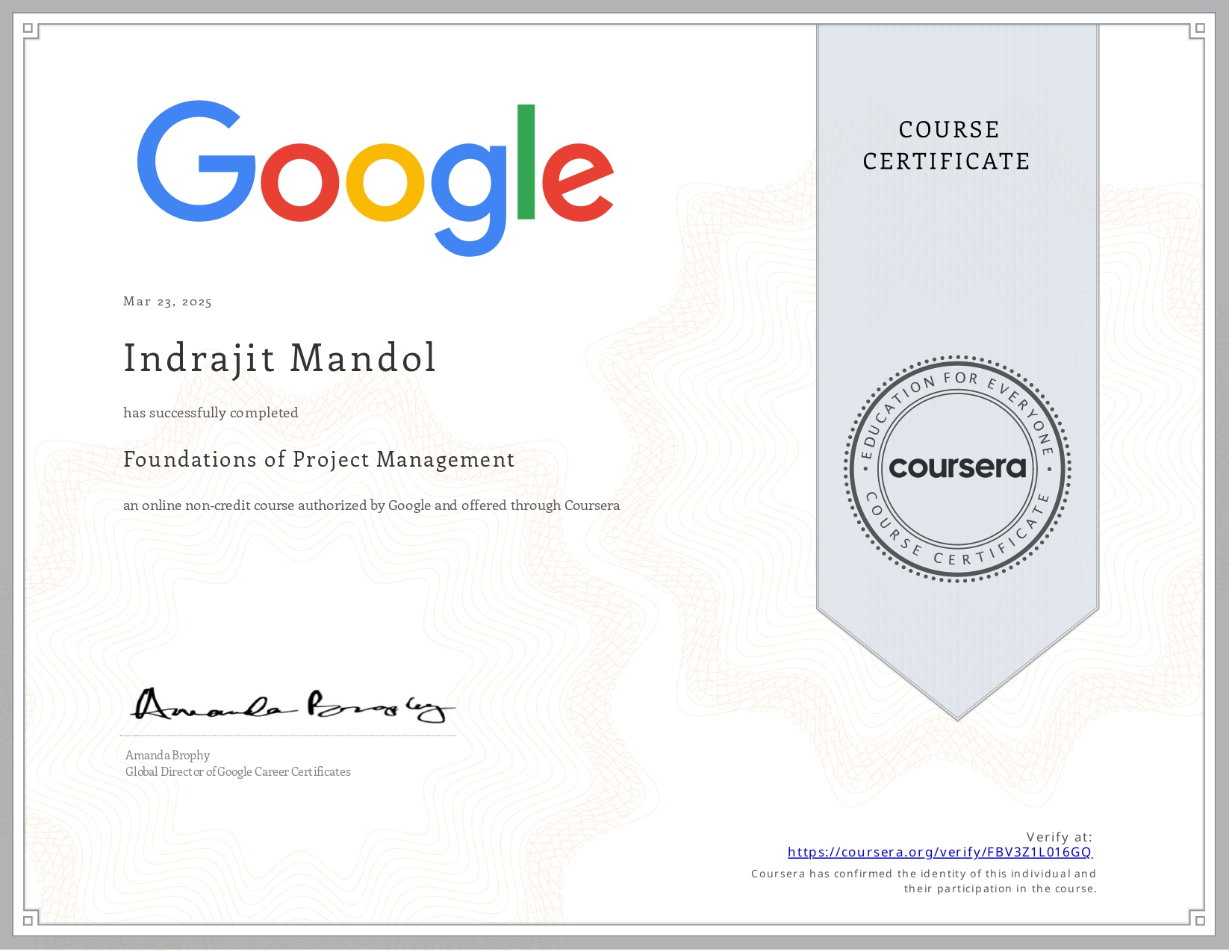What I Learned from the Foundations of Project Management Certification
 Indrajit Mandol
Indrajit Mandol
Introduction
Project management is a crucial skill for anyone looking to streamline workflows, manage teams effectively, and ensure the successful completion of projects. As a software engineer, I realized that having strong project management skills could help me handle tasks efficiently and collaborate better with teams. That’s why I decided to take Google’s Foundations of Project Management course on Coursera.
This course provided me with an in-depth understanding of project management principles, tools, and best practices. In this article, I’ll share my experience, key takeaways, and how I plan to apply my new knowledge.
Course Overview
The Foundations of Project Management course is the first part of the Google Project Management Certificate program. It is designed for beginners and covers the fundamental concepts of project management, including:
The role and responsibilities of a project manager
The project life cycle (Initiation, Planning, Execution, and Closure)
Key project management skills, such as communication, leadership, and problem-solving
Popular methodologies, including Agile, Scrum, and Waterfall
Stakeholder management and risk assessment
The course consists of video lectures, readings, quizzes, and hands-on assignments, making it an interactive and practical learning experience.
Key Takeaways
1. Understanding the Role of a Project Manager
One of the first things I learned was the importance of a project manager in any organization. A project manager is responsible for ensuring a project is completed on time, within budget, and meets the required standards. Some key responsibilities include:
Defining project scope and objectives
Managing risks and challenges
Communicating with stakeholders
Ensuring smooth team collaboration
2. The Project Life Cycle
The course introduced me to the four main phases of project management:
Initiation: Defining the project goals, scope, and feasibility.
Planning: Creating a roadmap, setting timelines, and allocating resources.
Execution: Carrying out the project according to the plan while monitoring progress.
Closure: Completing the project, evaluating outcomes, and documenting lessons learned.
3. Essential Project Management Skills
To be an effective project manager, certain skills are necessary. The course emphasized the following:
Communication Skills: Ensuring clear and open communication with team members and stakeholders.
Problem-Solving Abilities: Identifying and resolving project issues effectively.
Time Management: Prioritizing tasks and meeting deadlines efficiently.
Flexibility and Adaptability: Adjusting plans when unexpected changes arise.
4. Project Management Methodologies
The course covered several project management methodologies, including:
Waterfall Methodology: A linear, step-by-step approach best suited for projects with well-defined requirements.
Agile Methodology: A flexible, iterative approach that encourages collaboration and adaptation.
Scrum Framework: A subset of Agile that involves working in short iterations (sprints) and conducting daily stand-up meetings.
Learning about these methodologies helped me understand which approach is best suited for different types of projects.
5. Managing Stakeholders and Risks
A successful project requires effective stakeholder management and risk assessment. The course provided insights on:
Identifying key stakeholders and understanding their expectations
Communicating project updates transparently
Assessing potential risks and having contingency plans in place
Challenges and How I Overcame Them
One of the challenges I faced was time management. Balancing work and coursework required discipline, so I scheduled dedicated learning hours each day.
Another challenge was understanding Agile and Scrum concepts, as I had no prior experience with them. However, through additional research and practical assignments, I was able to grasp these frameworks effectively.
How I Plan to Apply My Learnings
Completing this course has given me a strong foundation in project management. Here’s how I plan to apply my new knowledge:
In my current work: Applying Agile principles and better organizing tasks using project management tools like Trello or Asana.
In my personal projects: Structuring tasks efficiently to complete software development projects on time.
Future learning: Exploring advanced project management certifications such as PMP or Agile Scrum Master.
Final Thoughts
The Foundations of Project Management course by Google was a fantastic learning experience. It provided me with valuable insights into project management concepts and practical skills that I can use in my career.
If you're interested in project management, I highly recommend this course! It’s beginner-friendly, well-structured, and provides real-world applications that make learning enjoyable.
Have you taken any project management courses? Share your thoughts in the comments! 🚀
#ProjectManagement #Learning #CareerGrowth #Coursera #TechLeadership
Subscribe to my newsletter
Read articles from Indrajit Mandol directly inside your inbox. Subscribe to the newsletter, and don't miss out.
Written by
